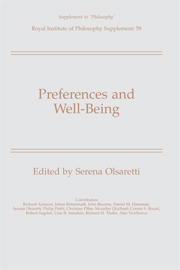Book contents
- Frontmatter
- Contents
- List of Contributors
- “Introduction”
- “Desire Formation and Human Good”
- “Preference Formation and Personal Good”
- “Leading a Life of One's Own: On Well-Being and Narrative Autonomy”
- “Well-Being, Adaptation and Human Limitations”
- “Consequentialism and Preference Formation in Economics and Game Theory”
- “Preferences, Deliberation and Satisfaction”
- “Content-Related and Attitude-Related Reasons for Preferences”
- “Reasoning with Preferences?”
- “Taking Unconsidered Preferences Seriously”
- “Preferences, Paternalism, and Liberty”
- “Preference Change and Interpersonal Comparisons of Welfare”
“Reasoning with Preferences?”
Published online by Cambridge University Press: 07 May 2010
- Frontmatter
- Contents
- List of Contributors
- “Introduction”
- “Desire Formation and Human Good”
- “Preference Formation and Personal Good”
- “Leading a Life of One's Own: On Well-Being and Narrative Autonomy”
- “Well-Being, Adaptation and Human Limitations”
- “Consequentialism and Preference Formation in Economics and Game Theory”
- “Preferences, Deliberation and Satisfaction”
- “Content-Related and Attitude-Related Reasons for Preferences”
- “Reasoning with Preferences?”
- “Taking Unconsidered Preferences Seriously”
- “Preferences, Paternalism, and Liberty”
- “Preference Change and Interpersonal Comparisons of Welfare”
Summary
Reasoning and requirements of rationality
Rationality requires certain things of you. It requires you not to have contradictory beliefs or intentions, not to intend something you believe to be impossible, to believe what obviously follows from something you believe, and so on. Its requirements can be expressed using schemata such as:
Modus ponens. Rationality requires of N that, if N believes p and N believe that if p then q, then N believes q.
Necessary means. Rationality requires of N that, if N intends that e, and if N believes that e will be so only if m is so, and if N believes m will be so only if she intends that m, then N intends that m.
Krasia. Rationality requires of N that, if N believes she ought to F, and if N believes she will F only if she intends to F, then N intends to F.
(‘She’ is to be read as a reflexive pronoun.) It may be questioned whether any of these formulae express genuine requirements of rationality. Their precise formulation may be inaccurate, at least. But these formulae are not the subject of this paper, and for the sake of argument I shall assume they are correct. In any case, they are only examples of requirements of rationality (or ‘rational requirements’, as I shall often say); rationality requires many things of you besides these.
- Type
- Chapter
- Information
- Preferences and Well-Being , pp. 183 - 208Publisher: Cambridge University PressPrint publication year: 2006
- 8
- Cited by

